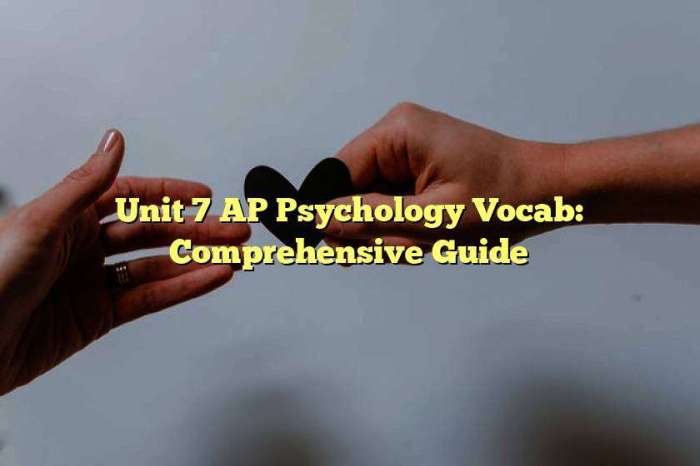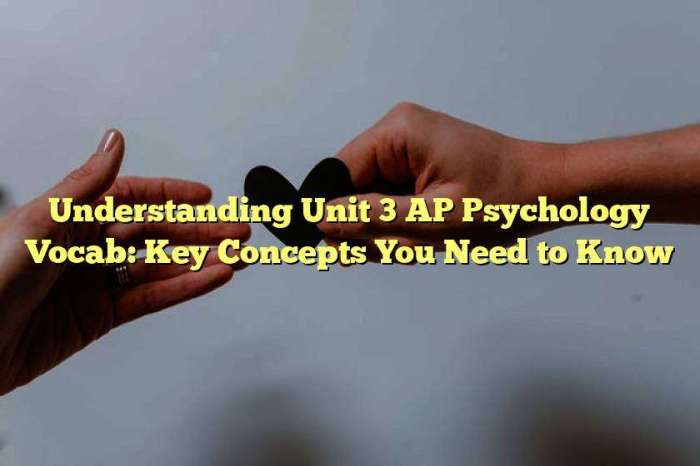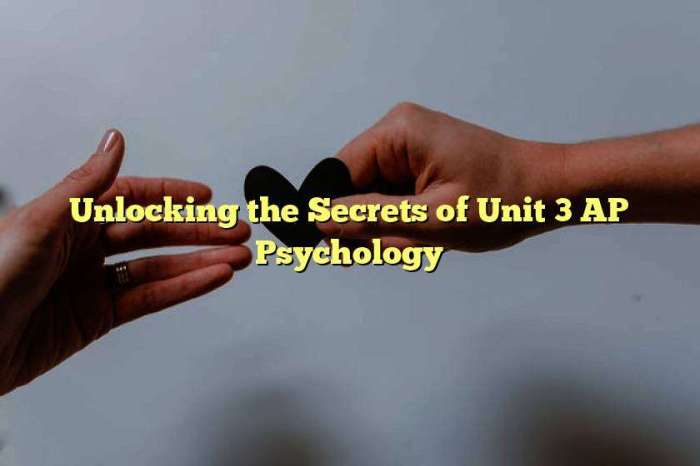Unit 3 AP Psychology Vocabulary: Embark on an illuminating journey into the depths of the human mind, where we uncover the language that unlocks the mysteries of psychology.
Delve into the unconscious mind, explore defense mechanisms, unravel the enigma of dreams, and delve into the profound impact of childhood experiences on personality development.
Core Concepts of Unit 3 AP Psychology
Unit 3 of AP Psychology delves into the unconscious mind and its profound influence on our thoughts, feelings, and behaviors. We will explore the significance of the unconscious mind, uncover the mechanisms it employs to protect us, and delve into the enigmatic world of dreams.
The Unconscious Mind
The unconscious mind, a vast reservoir of thoughts, feelings, and memories, lies beneath the surface of our conscious awareness. It exerts a powerful influence on our daily lives, shaping our perceptions, behaviors, and emotional responses.
Defense Mechanisms
Defense mechanisms are psychological strategies employed by the unconscious mind to protect us from anxiety and other unpleasant emotions. Common defense mechanisms include:
- Repression:Banishing threatening thoughts or memories from conscious awareness.
- Projection:Attributing one’s own unacceptable thoughts or feelings to others.
- Displacement:Redirecting emotions from their true target to a safer substitute.
Dreams and Their Interpretation
Dreams, enigmatic journeys into the unconscious mind, have fascinated humans for centuries. Various theories attempt to explain their meaning and significance:
- Freudian Theory:Dreams are the “royal road to the unconscious,” revealing hidden desires and conflicts.
- Cognitive Theory:Dreams serve to consolidate and process information from the day.
- Physiological Theory:Dreams are a byproduct of brain activity during sleep.
Psychoanalytic Theory and Its Applications
Sigmund Freud’s psychoanalytic theory has had a profound impact on our understanding of the human mind. It focuses on the unconscious mind and the role of childhood experiences in shaping personality.
Key Principles of Freud’s Psychoanalytic Theory
- The unconscious mind: Freud believed that the majority of our mental processes occur outside of our conscious awareness. This includes repressed memories, thoughts, and feelings.
- Childhood experiences: Freud emphasized the importance of childhood experiences in shaping personality. He believed that conflicts and traumas experienced in childhood could lead to psychological problems in adulthood.
- Defense mechanisms: Freud proposed that the mind uses defense mechanisms to protect itself from anxiety and other unpleasant emotions. These mechanisms include repression, projection, and rationalization.
The Id, Ego, and Superego
Freud divided the mind into three parts:
- The id: The id is the impulsive, pleasure-seeking part of the mind. It operates on the “pleasure principle” and seeks immediate gratification.
- The ego: The ego is the mediator between the id and the superego. It operates on the “reality principle” and tries to find ways to satisfy the id’s needs in a socially acceptable way.
- The superego: The superego is the moral compass of the mind. It represents our conscience and tells us what is right and wrong.
Impact of Childhood Experiences on Personality Development
Freud believed that childhood experiences play a crucial role in shaping personality. He identified several key stages of psychosexual development that occur during childhood:
- Oral stage: During the oral stage, infants derive pleasure from sucking and biting.
- Anal stage: During the anal stage, toddlers derive pleasure from controlling their bowels.
- Phallic stage: During the phallic stage, children develop sexual feelings towards their parents.
- Latency stage: During the latency stage, sexual feelings are repressed.
- Genital stage: During the genital stage, sexual feelings re-emerge and individuals develop mature sexual relationships.
Freud believed that conflicts and traumas experienced during these stages could lead to psychological problems in adulthood.
Learning and Conditioning
Learning is a fundamental process through which individuals acquire new knowledge, skills, and behaviors. Conditioning, a type of learning, involves establishing associations between stimuli and responses. There are two main types of conditioning: classical conditioning and operant conditioning.
Classical Conditioning
Classical conditioning was first described by Ivan Pavlov in his famous experiment with dogs. In classical conditioning, a neutral stimulus (e.g., a bell) is paired with a meaningful stimulus (e.g., food) that naturally elicits a response (e.g., salivation).
Over time, the neutral stimulus alone can elicit the response, even in the absence of the meaningful stimulus. This process is known as stimulus substitution.
- Conditioned Stimulus (CS):A previously neutral stimulus that, after being paired with an unconditioned stimulus, elicits a conditioned response.
- Unconditioned Stimulus (US):A stimulus that naturally elicits a response without prior learning.
- Conditioned Response (CR):A response that is learned and elicited by the conditioned stimulus.
- Unconditioned Response (UR):A response that is naturally elicited by the unconditioned stimulus.
Classical conditioning has many applications in the real world, such as:
- Phobias:Classical conditioning can lead to the development of phobias, where a neutral stimulus (e.g., a spider) becomes associated with a negative experience (e.g., being bitten) and elicits a fear response.
- Advertising:Companies use classical conditioning to associate their products with positive experiences (e.g., happiness, success) through advertising campaigns.
Memory and Cognition
Memory is the ability to encode, store, and retrieve information. Cognition refers to the mental processes involved in acquiring knowledge and understanding. Memory and cognition are closely intertwined, as memory provides the foundation for cognitive processes such as learning, thinking, and problem-solving.
Types of Memory
There are three main types of memory:
- Sensory memorystores sensory information for a very brief period (less than a second). It is divided into iconic memory (visual information) and echoic memory (auditory information).
- Short-term memory(STM) stores information for a few seconds or minutes. It has a limited capacity of about 7 items.
- Long-term memory(LTM) stores information for an indefinite period. It has a virtually unlimited capacity.
Memory Formation and Retrieval
Memory formation involves three main stages:
- Encoding: Converting information into a form that can be stored in memory.
- Storage: Maintaining information in memory over time.
- Retrieval: Accessing information from memory.
Retrieval can be either conscious (intentional) or unconscious (automatic).
Factors Influencing Forgetting and Memory Distortion
Forgetting is the inability to retrieve information from memory. It can be caused by:
- Decay: The gradual loss of memory over time.
- Interference: The disruption of memory by other information.
- Motivated forgetting: The intentional suppression of memories.
Memory distortion occurs when memories are altered or distorted over time. This can be caused by factors such as:
- Misinformation: Exposure to inaccurate information after an event.
- Source amnesia: Forgetting the source of a memory.
- Confabulation: Filling in gaps in memory with false information.
Developmental Psychology

Developmental psychology explores the physical, cognitive, and social changes that individuals undergo throughout their lifespan. It examines how these changes occur and the factors that influence them.
Piaget’s Stages of Cognitive Development
Jean Piaget proposed a stage theory of cognitive development, suggesting that children’s thinking develops through distinct stages:
- Sensorimotor Stage (0-2 years):Infants learn through sensory experiences and motor actions.
- Preoperational Stage (2-7 years):Children develop language and symbolic thinking but struggle with logical reasoning.
- Concrete Operational Stage (7-11 years):Children become more logical and can solve concrete problems but still have difficulty with abstract concepts.
- Formal Operational Stage (11 years and beyond):Adolescents and adults develop abstract thinking, hypothetical reasoning, and a capacity for introspection.
Social and Cultural Factors in Development
Social and cultural factors play a significant role in shaping development:
- Family:Family interactions, parenting styles, and socioeconomic status influence children’s cognitive, social, and emotional development.
- Peers:Peer relationships provide opportunities for socialization, learning, and self-discovery.
- Culture:Cultural values, beliefs, and practices shape individuals’ development in various ways, including their cognitive abilities, social norms, and self-concept.
Attachment Theory
Attachment theory, proposed by John Bowlby, describes the strong emotional bond that develops between a child and their primary caregiver:
- Secure Attachment:Children who have secure attachments feel loved, safe, and supported, which fosters healthy emotional development.
- Insecure Attachment:Children who have insecure attachments may experience anxiety, insecurity, and difficulty forming relationships.
Attachment theory has significant implications for child development, highlighting the importance of stable and supportive relationships for children’s emotional well-being and overall development.
Unit 3 AP Psychology vocab can be a bit dry, but it’s essential for understanding the basics of psychology. To make it more engaging, consider exploring the concept of “two feet of love in action” here . This idea emphasizes the importance of empathy and compassion in our interactions, which is a key theme in Unit 3. By connecting these concepts, you’ll gain a deeper understanding of both psychology and the power of human connection.
Social Psychology

Social psychology explores the influence of social factors on individual thoughts, feelings, and behaviors. It examines how our interactions with others shape our perceptions, attitudes, and actions.
Principles of Social Cognition
Social cognition refers to the mental processes involved in understanding and interacting with others. It includes:
- Social Perception:Forming impressions and judgments about others based on their appearance, behavior, and social cues.
- Attribution:Explaining the causes of others’ behavior, either internally (personal traits) or externally (situational factors).
- Self-Concept:The beliefs and perceptions we hold about ourselves, which influence our social interactions and self-esteem.
Social Influence
Social influence refers to the ways in which others affect our thoughts and actions. It can take various forms:
- Conformity:Changing our behavior or beliefs to match those of a group.
- Compliance:Yielding to the requests or demands of others, even if we do not agree.
- Obedience:Following the orders of an authority figure, even if they conflict with our moral values.
Group Dynamics
Groups can exert a significant influence on individual behavior. Group dynamics refers to the interactions and processes that occur within groups:
- Group Cohesion:The extent to which group members are attracted to and feel connected to the group.
- Group Norms:Unwritten rules and expectations that guide group members’ behavior.
- Groupthink:A phenomenon where group members prioritize conformity over critical thinking, leading to flawed decision-making.
Personality Theories: Unit 3 Ap Psychology Vocab
Personality refers to the unique and relatively stable patterns of thoughts, feelings, and behaviors that characterize an individual. Personality theories attempt to explain the development, structure, and dynamics of personality.
There are several major personality theories, each with its own unique perspective on personality:
Trait Theory
Trait theory suggests that personality is composed of a set of relatively stable and enduring traits. These traits are assumed to be inherited and relatively resistant to change. Some common traits include extroversion, introversion, agreeableness, conscientiousness, and neuroticism.
Psychodynamic Theory
Psychodynamic theory emphasizes the role of unconscious processes in shaping personality. It suggests that personality is largely determined by early childhood experiences and conflicts that are repressed into the unconscious mind. Key concepts in psychodynamic theory include the id, ego, and superego.
Humanistic Theory
Humanistic theory focuses on the individual’s potential for growth and self-actualization. It emphasizes the importance of free will, personal responsibility, and the striving for meaning and purpose in life.
Personality Assessment
Personality assessment involves using various methods to measure and evaluate an individual’s personality. These methods include:
- Interviews
- Self-report questionnaires
- Projective tests
- Behavioral observations
Factors Contributing to Personality Development, Unit 3 ap psychology vocab
Personality is influenced by a complex interplay of factors, including:
- Genetics
- Environment
- Culture
- Early childhood experiences
- Social interactions
Psychological Disorders

Psychological disorders are characterized by abnormal thoughts, feelings, and behaviors that significantly impair an individual’s functioning. These disorders can range in severity from mild to severe, and they can affect people of all ages, genders, and backgrounds.
There are several major categories of psychological disorders, including anxiety disorders, mood disorders, and psychotic disorders. Each category has its own unique set of symptoms and causes.
Anxiety Disorders
Anxiety disorders are characterized by excessive fear or anxiety that is difficult to control. People with anxiety disorders may experience physical symptoms such as sweating, trembling, and shortness of breath. They may also avoid situations that trigger their anxiety.
There are several different types of anxiety disorders, including generalized anxiety disorder, panic disorder, and social anxiety disorder.
Mood Disorders
Mood disorders are characterized by changes in mood that are severe and persistent. People with mood disorders may experience episodes of depression, mania, or both.
Depression is characterized by feelings of sadness, hopelessness, and worthlessness. People with depression may lose interest in activities they once enjoyed and have difficulty sleeping, eating, and concentrating.
Mania is characterized by feelings of euphoria, grandiosity, and increased energy. People with mania may talk quickly, have racing thoughts, and engage in risky behaviors.
Psychotic Disorders
Psychotic disorders are characterized by a loss of contact with reality. People with psychotic disorders may experience hallucinations, delusions, and disorganized thinking.
Schizophrenia is a type of psychotic disorder that is characterized by hallucinations, delusions, and disorganized speech. People with schizophrenia may also experience social withdrawal and difficulty functioning in everyday life.
FAQ Guide
What is the significance of defense mechanisms in psychology?
Defense mechanisms are crucial psychological strategies that protect the ego from anxiety and maintain a sense of psychological balance.
How do different theories of dreams contribute to our understanding of the unconscious mind?
Dream theories provide diverse perspectives on the unconscious mind, offering insights into its symbolic language, wish fulfillment, and problem-solving functions.